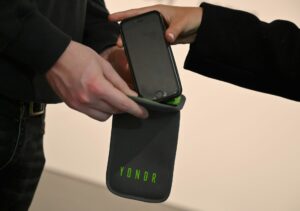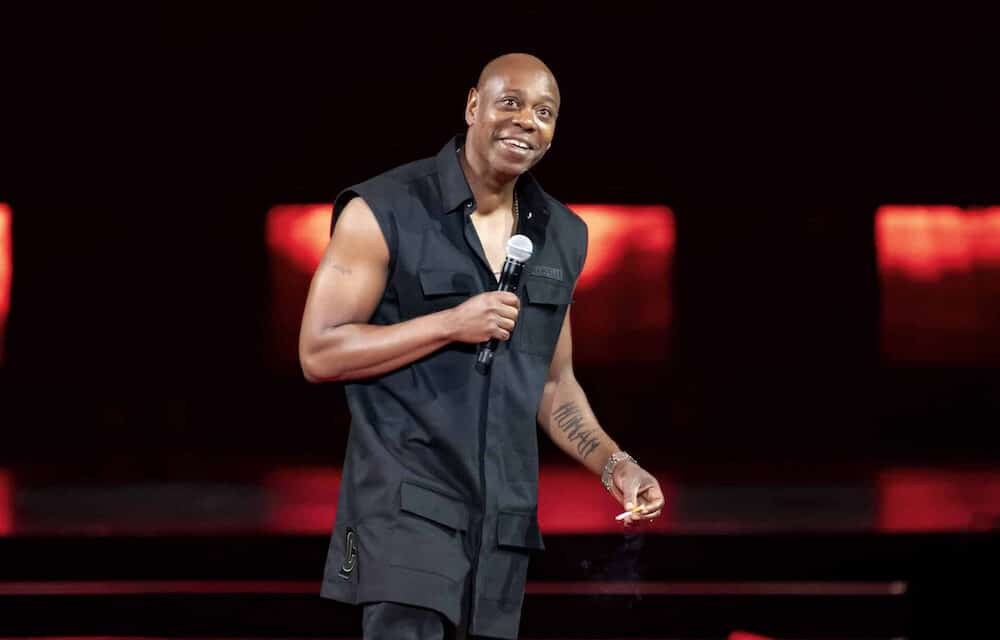CHAPPELLE SHOW: Comedian Dave Chappelle performed at Madison Square Garden on Aug. 22 as part of his 50th birthday celebration. (AP Photo)
Arenas fine-tune phone-free process
A funny thing happened in the moments before comedian Dave Chappelle’s recent performance at Amway Center before a near sell-out crowd of 16,613. Ticket holders, without access to their cell phones which were locked in Yondr pouches, engaged in conversations with fellow patrons.
“It’s actually a strange sound,” said Allen Johnson, chief venues officer in Orlando, including the NBA arena that played host to Chappelle on Nov. 2. “Usually, before a show, it’s kind of quiet with a little bit of a buzz. Because they now have nothing to do or look at, they talk to each other. It’s amazing.”
The situation was old school, bringing the live experience back to what it was 30 years ago before the age of mobile technology changed the dynamics of live entertainment.
Chappelle fans don’t seem to mind the restrictions. Ticket grosses topped $2 million for single shows this fall at seven arenas, according to Pollstar data.
Four shows at Madison Square Garden in August raked in $7.9 million with total attendance of 49,140. Two performances at TD Garden grossed $4.4 million with a combined 28,120 attendees.
At Amway Center alone, the total take was $2,004,889.
Eight years after Yondr launched in 2014, the industry continues to make adjustments for phone-free events to accommodate the artists, while arenas do their best to maintain high standards in customer service to ensure a quality guest experience.
The low-tech system is used by several comedians to protect their jokes from leaking out over social media and spoiling plans for future broadcast and streaming specials. Dave Chappelle is among Yondr’s investors. In the live music realm, Bob Dylan, Jack White and Chance the Rapper are among the recording artists that have deployed Yondr on tour.

SURRENDER: Yondr has expanded its reach as more comedians tour arenas. (Getty Images)
Over the past eight years, Yondr has been used mostly in a theater setting, but it’s now expanded to big league venues, including Chappelle’s tour, which he performs in the round. As a result, the logistics of locking 15,000 to 18,000 phones in pouches before patrons enter the arena takes greater coordination of resources to complete the phone-free process.
“It’s a learning curve for everybody,” said Andy Arnold, senior vice president of facility operations at Gainbridge Fieldhouse in Indianapolis, where Chappelle performed Sept. 13. “The fan is the variable. As Yondr becomes more normalized and more people are aware of it, they’re prepared when they walk up to our checkpoints.”
Arnold said, “One thing that we continue to learn is the different types of technology now that Yondr and the artists are trying to protect against, whether it’s smart watches or smart glasses (with recording capabilities). Yondr does a good job of adapting with the times as technology in general advances.”
Operationally, Yondr essentially reverses the steps taken for ticket holders to enter the venue.
Typically, patrons go through security checkpoints before having their digital tickets scanned on their mobile devices. Under Yondr’s system, the customer must present the digital ticket to an individual working the show, who writes down their section, row and seat number on a piece of paper and hands it to the customer.
At that point, the ticket holder must put their phone into a Yondr pouch, they keep on their person during the show. The key to unlock the pouch is held by Yondr staff.
The ticket holder then goes through security, the final step of the process.
At the end of the event, patrons find a Yondr staffer to unlock the pouch to retrieve their phone before leaving the arena. At every venue, officials set up multiple unlocking stations for patrons to use their phone in the event of an emergency or checking in with the babysitter, for example, before putting it back in the locked pouch.
Many big league arenas have experience with Yondr from past performances with Chappelle and fellow comedian Kevin Hart, and they continue to fine-tune the process to make it as seamless as possible.
As Arnold mentioned, repetition is key. Most patrons are familiar with the system and understand why it’s in place to protect the artist’s intellectual property. Advance messaging through “know before you go” emails has been helpful, they said.

WAITING GAME: Ticket holders for Dave Chappelle line up to enter Amway Center for the phone-free event on Nov. 2. (Courtesy venue)
Still, it can be cumbersome. At Amway Center, there were long lines outside the arena as things slowed down with Yondr workers writing down individual seat numbers. Chappelle’s 360-degree setup with seats on the floor produced one of the biggest crowds of the year at the arena. For that event, Johnson said he went outside the arena and worked the lines to help reduce congestion.
“It’s a complicated process because you’re basically taking the key to the person’s ticket,” he said. “There’s an extra step to write down the seat locator that you don’t typically have, which takes the longest period of time. People are used to walking into our venue quickly. It doesn’t happen that way (with Yondr). The line was significantly long, but it moved.”
In other markets, such as Indianapolis and Milwaukee, arenas use additional staff to support Yondr at the doors to help expedite the process. At Fiserv Forum, which played host to Chappelle on Oct. 17, as fans approached the building, they heard audio messages and saw digital signs alerting them to the Yondr system, said Dennis Williams, the arena’s senior vice president and general manager.
“If anything, we advise people to give themselves extra time to check in when they arrive,” Williams said. “Come early if it’s a Yondr show. The checking and screening takes a little bit longer, but it’s in everybody’s best interest.”
One arena manager interviewed by VenuesNow had issues with Yondr workers involved in the seat locator step for Chappelle, whether it writing the wrong seat number down or illegible numbers on the piece of paper.
To resolve the situation, the arena manager, who requested anonymity to avoid potentially losing dates for future Chappelle tours, said he planned to have his ticket sales and guest experience staff pitch in for administering seat locators for the next Yondr event because they know the arena best, compared with part-time Yondr workers unfamiliar with the seating layout.
“Sometimes, the seat locator is clear and sometimes it’s not,” he said. “Sometimes, it’s correct, sometimes it’s not and it becomes problematic. We hope it speeds up the process and eliminates a lot of the mistakes that we saw.”
For all involved, they must recognize that it’s an imperfect process involving a human being writing something down on a piece of paper, said David Kells, chief venues officer at Bridgestone Arena in Nashville.
“Once fans are inside the arena, they’re here to see somebody that they love and chose to make a night of,” Kells said. “There are some backups, but every time, we get a little bit better. Yondr does a great job.”







